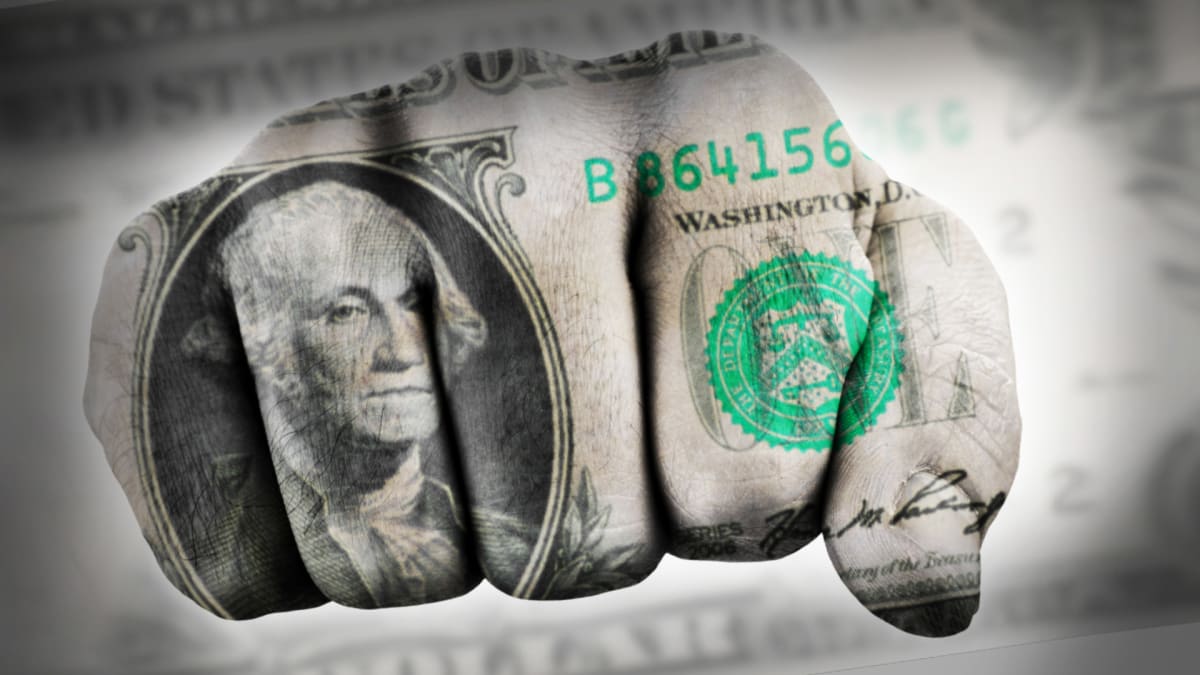
From time to time investors chatter that the dollar will soon lose its status as the world’s primary reserve currency.
Now appears to be one of those times. But it’s idle speculation.
Kathy Jones, chief fixed-income strategist for Charles Schwab, put it well in a recent report:
“A long-term trend toward diversification of currencies in global financial transactions and trade may develop,” she noted. “But it's a big leap from dollar dominance to dedollarization.”
Don't Miss: Fed Looks Set to Raise Rates Once More After Inflation Data
Central banks have diversified their foreign-currency holdings over the past 20 years, particularly in light of the euro’s introduction in 1999. But the dollar still accounts for 60% of global foreign reserves, not too far down from 20 years ago, when the figure was 67%.
About half of global trade is conducted in dollars. And about half of international loans and debt-securities trading on offshore markets are denominated in dollars. Also, the greenback is used in 80% of financial-market transactions, according to Jones.
The U.S. has the deepest and most liquid capital markets, which have turned Treasury bonds into the world’s safe-haven asset. Foreign holdings of U.S. Treasury securities have expanded over the years to $7.4 trillion as of Jan. 31.
To be sure, real trouble could ensue if the government doesn’t increase the debt limit, potentially forcing a default on Treasurys. But that’s highly unlikely.
Dollar's Appreciation Against Other Currencies
The dollar has shown strength against other currencies, with the Federal Reserve Real Trade-Weighted Dollar Index climbing 40% from 2011 to 2022, as Jones points out.
Some have speculated that China’s yuan could replace the dollar as the world’s main reserve currency. But China’s capital controls would make that impractical, and the yuan isn’t fully freely traded.
Brad McMillan, chief investment officer for Commonwealth Financial Network, offers an interesting thought experiment to illustrate why China’s currency is unlikely to unseat the dollar.
“Suppose I told you that Amazon would collapse this year and that people would abandon it and flock to other merchants (e.g., Walmart),” he wrote in a commentary.
“That argument makes a certain amount of sense, in that Walmart is indeed a valid competitor … and spending a lot of money to take business from Amazon, and has the scale to do so credibly. In that sense, I have a good case that Amazon is going to collapse.
“But when you think about it, the idea is kind of silly. Personally, I have an Amazon Prime account, I have multiple orders preset, I watch Prime Video, and so on. It would be a lot of work and a major inconvenience to switch….
Amazon (Dollar) Collapse Not Credible
“Unless you believe that tens of millions of people are suddenly going to do the work and endure the inconvenience of switching, then the idea that Amazon will suddenly collapse simply isn’t credible. You can substitute the dollar for Amazon and the renminbi [yuan] for Walmart.
Don't Miss: Women's Sports Becoming Bigger Business, Better Investment
“Yes, China would like to dethrone the dollar, but it isn’t that simple. As long as the U.S. is the largest open trading economy, as long as everyone in the world wants access to the U.S. economy, and as long as it is a lot of work and a great inconvenience to switch, the position of the dollar as the global reserve currency is secure.
“China itself is a good example of this, as it holds more than $1 trillion of U.S. assets. It doesn’t do so because it wants to but because it has to. When China sells things to the U.S., it gets paid in dollars. It then has to invest those dollars. Since there are so many of them, the only real option is U.S. Treasury securities.”
The euro is the only other currency big enough to take on the dollar, but it has shortcomings of its own. First there is nothing like U.S. Treasury bonds in Europe because each nation has its own bond market. So a German bond will have a different yield than an Italian bond. That makes the euro less useful to investors.
And the U.S. is more political stable than Europe, for the moment anyway.
To borrow from Mark Twain, apparently inaccurately, rumors of the dollar’s death are greatly exaggerated.
Receive full access to real-time market analysis along with stock, commodities, and options trading recommendations. Sign up for Real Money Pro now.







